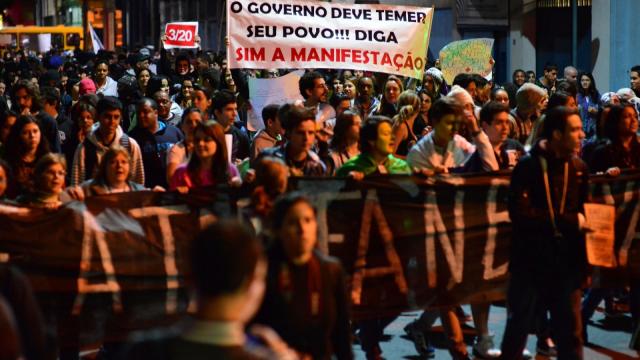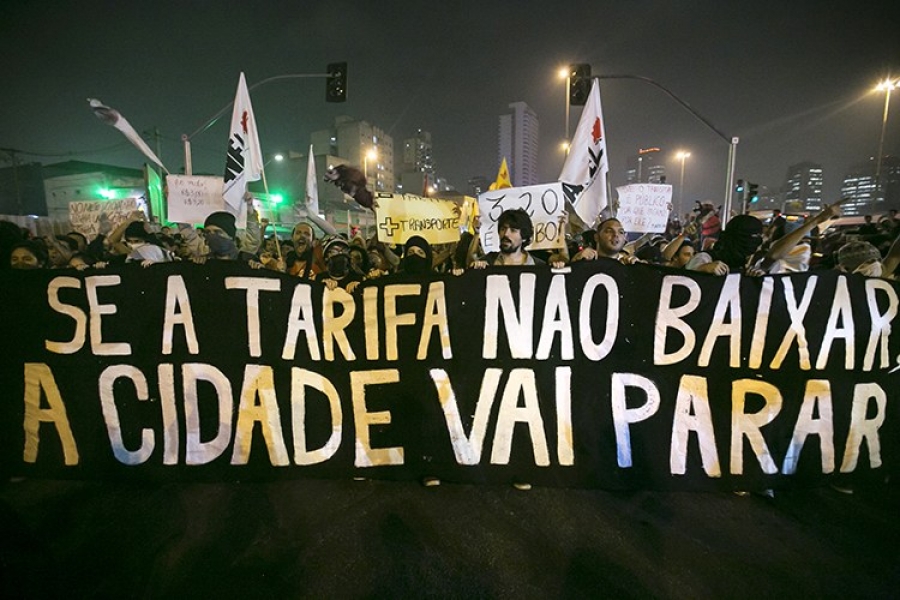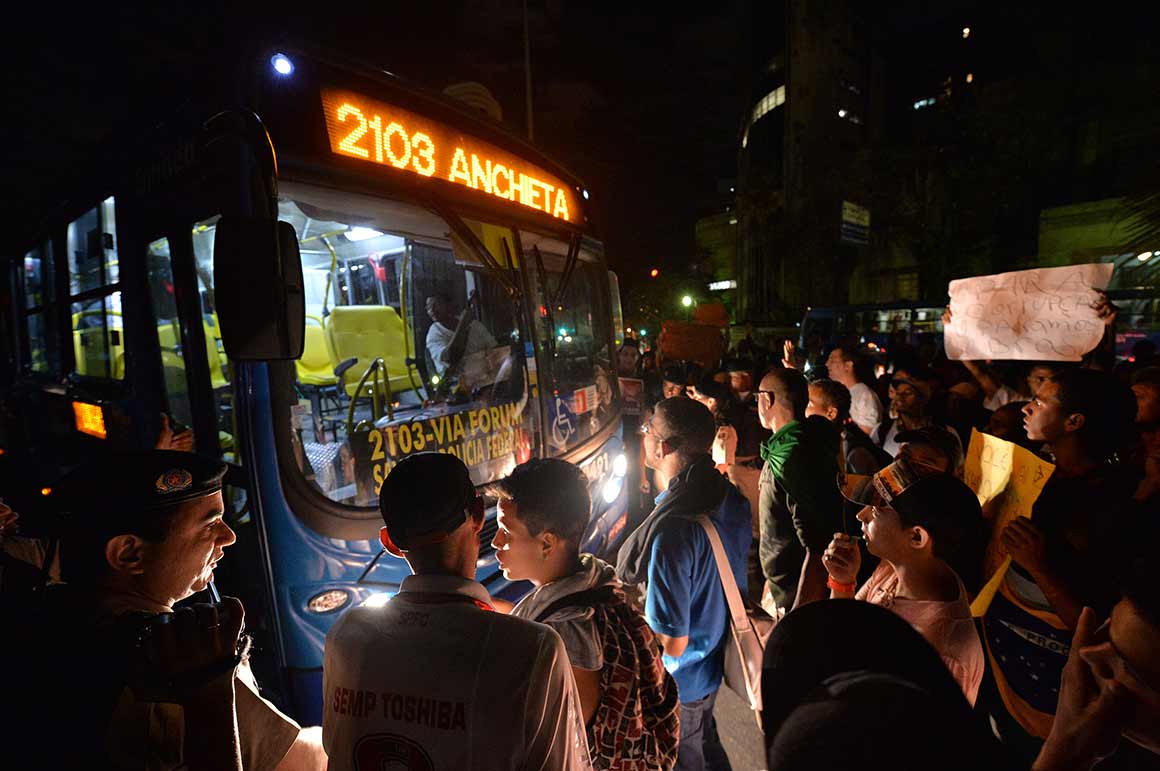
All Photos by João Priolli
Brazil is currently going through a complex political process and maybe uncertainty is the best word to express not only the future but also any analysis of what has already happened, its motivating reasons, and the possible outcomes.
While our focus is on São Paulo, there are similarities among the scenarios of most of the country’s major cities – the bus fare hikes as the initial motive, the manner in which the calls to the protests were made, corporate media’s role and the process under which dissatisfaction towards political institutions took form as the protests became bigger.
If you look into the urban life of a Brazilian metropolis it is easy to realize why public transportation prices can be such an outrageous issue, as well as the importance of the debate that Movimento Passe Livre – MPL (Free Fare Movement) has cast a light on. In recent years, there has been an explosion of automobile use and cities have been organizing themselves around cars, damaging not only the public transportation system but also urban mobility.
The real estate boom and its main drivers, such as large condo units and shopping malls, have produced higher demographic rates and have driven away many residents due to real estate speculation, increasing exclusion and social inequality. As a consequence, the living conditions of poorer populations are worse off: they live further away from their jobs, studying places, health services and possible leisure activities.
Instead of at least helping people keep pace with the difficult situation, public transportation (such as buses, trains and subways) is completely precarious. Equipment is generally poorly maintained, and the system lines themselves are insufficient, not to mention poorly interconnected. In fact, collective transportation in Brazil is controlled by very few cartels, which are guided completely by private corporate interests – as evidenced in the rate increase from R$3 to R$3.2 in a country where the minimum wage is R$678.
In response to the abusive fare increases, the recent protests guided by MPL make way, once again, for direct action tactics: taking the struggle out into the streets to effectively confront private interests and recent state politics.
It is important to say that the established tradition of struggle had been growing ever more fragile in Brazil, decreasing along with the hard neoliberal years that followed the end of the dictatorship, and especially when the traditional leftist Workers Party was elected to the presidency in 2002. The years that followed saw political action fundamentally conducted in boards, forums and other manners so as to make concessions to the right-wing appear in the name of "governability."
On June 13, the fourth demonstration organized by the MPL was severely repressed. The three previous ones had also been met with violence but more towards the end of the protests. Major newspapers called for a strict response to the "vandals" who were protesting, “impeding traffic” and “threatening private and public propriety.” The peaceful protest held on the 13th was literally ambushed by riot police as crowds entered the first major avenue, and many of the 20,000 protesters got cornered and chased around with tear gas and rubber bullets. Cars, old ladies and children on the streets were equally targeted, as well as journalists from aforementioned news outlets. People were arrested for absurd reasons, such as carrying around vinegar, which is effective against tear gas.
On June 14, the media turned from water to wine. Thanks to plural sources of counter-information activity largely on the Internet, pictures of the repression were published worldwide and a great part of population started supporting the protests. In their eyes suddenly we weren't vandals anymore; even the most conservative media corporations came out in favor of us. It seemed like a victory. The next protest was scheduled for June 17 and in São Paulo at least 300,000 confirmed their participation via Facebook — the most influential communication channel in Brazil since the protests began.
When June 17 arrived, police had said no one would be arrested for carrying vinegar and that rubber bullets and tear gas would not be used, due to people's right to protest. But the scenario on the ground was quite different. In fact, it was one of the biggest demonstrations in our history, but the sources of indignation that brought people into the streets were diffuse. Many people were bearing Brazilian flags, a symbol often associated with right-wing nationalist movements and the military dictatorship (left-wing parties were being told to put down their flags). It's important to recognize that many of these people were at a protest for the very first time, not intentionally defending conservative positions — but, more importantly, expressing that they did not feel represented by a political party.
Corporative media became suddenly very excited about the ongoing "democratic event," and enthusiastic that it was not just about the 20 cents (R$0,20) bus fare hike. In fact, those who were in favor of the protests from the beginning, such as MPL members, understood that the change in the corporate media's position also reflected the larger problematic structure of public transit in Brazil, which is becoming recognized as a direct contributor to social inequality.
And that is exactly why it was so important to fight against those 20 cents — not just forget them — as a first step toward our bigger objectives.
Unfortunately, the damage caused by the corporate media was already done, and it brought additional problems to those who continued the protest. On June 18, another demonstration happened as the protests spread fast throughout the country; this one was very large, but also composed by irreconcilable elements. People were carrying around Brazilian flags and signs ranged from the defense of the death sentence to the overthrow of government because of "corruption" — as if corruption were specific to one party, not to all the parties in control.
People chanted at the mayor, "Haddad Leave!" and at the president, "Dilma Leave!" That day police were nowhere to be found. The temperature rose and left-leaning people were threatened as their claims were diluted in chants of "I am Brazilian with much love and pride."
Then, on June 19, 11 cities around Brazil revoked the fare increase and in São Paulo the rate returned to R$3. We celebrated as we won something, our first step – and only because we fought on the streets. The protest already scheduled for the next day turned into a celebration party.
However, on June 20, it turned out the party-free people were fascists, as many suspected all along. Maybe not all of them, but many had bought into the idea that the mainstream media had been pouring into them. And this time, violence did not come from the police. It came from the flag-clad people. They forbid the participation of anyone carrying flags that were not Brazilian flags, and they beat people up, burn flags and impeded those from MPL (who, by the way, are not affiliated with any party) from staying on the street without fearing for their physical safety. Skinheads joined the scene, things got grim and left-leaning people left the protest. The media said everything ran smoothly, that people were celebrating as if it were the World Cup and had overcome ideology, as if tearing and burning flags weren’t ideological.
So, in that short period of almost 15 days, we could see that the protests against the increase in fares had rapidly gone through three important moments: first, criminalization; second, an increase in popular support and victory; third, political polarization of society. News coming from other cities also showed that there was real danger to all left-wing people. For a moment, some saw a coup d’état on the horizon, as nationalism, rejection of political parties and criticism towards the government in power shaped into a dangerous mix.
The MPL has decided not to call any more protests for the time being. Some said that we cannot compete with what became of the recent demonstrations – which is true – and in fact the streets were already taken, people could already taste their power and the internet gave all the opportunity to forge direct actions easily and horizontally, which had been MPL’s modus operandi since the beginning. And, most importantly, we had gotten the fare’s decrease.
That didn’t mean we had to stop our struggle – and that wasn’t MPL’s goal. But now it is a very important moment to carefully define the project of the society we want. Instead of sharing the marches with those who claim abstractly against “corruption,” just to hide their privileges, at this moment it's important to reveal all the injuries and contradictions of capitalism. In this sense, the first act called by MPL after the victory of the fare’s decrease was formed in partnership with organized groups from poor outskirts, now highlighting free fare, as other marches exploded and are still ongoing, due to varied motives.
Although Brazil has been witnessing relative stability and economic prosperity while great parts of the world have been struggling with the effects of the financial crisis, it is important to say that we still have a serious lack of basic services and huge inequality along with an authoritarian and patriarchal heritage that affects especially the social rights of women and minorities. There are still many things to fix, but in the midst of confronting discourses there are some who talk about change just to keep or reinforce things as they are.
So, this is the time to dispute in the streets that have recently re-opened. People are now discussing on every corner. They are self-organizing according to their demands, making their own posters, demanding to be listened to. And the debates on politics and the country’s situation deeply resonates now in everyday life.
The lesson to be learned is that occupying public space is really the correct direction. It is only when we are on the streets, fighting together for ourselves, that there is possibility to achieve something new. These recent national demonstrations were so important that Dilma’s government has signaled towards some possible changes regarding our political structure, health system and urban mobility. We don’t know how deep such changes may be, but recent years have taught us not to believe that government will provide the complete radical changes that are needed.
Instead, occupying and standing on the streets is more necessary than ever. In some cities that hosted the Confederations Cup (such as Belo Horizonte and Rio de Janeiro) and in other places where strong police repression still continues, people are now organizing people’s assemblies, strengthening their protests, occupying political bureaus, etc. It is in no way clear how best to proceed, nor are we sure about the strategy that should be implemented. It is a difficult process where we must confront the shift towards conservative positions, the old automated procedures of the left-wing tradition, the international interests imposed by FIFA, the government’s attempts to minimize the protests, and corporate media that now mention “vandalism” again, hiding police abuse and spreading fear among those who still haven’t set foot on the streets.
Maybe all of this is just part of building the new alternative. Nobody said it would be easy, but it is crucial to try, as so many people are doing around the world.
Mariana Ruggieri contributed to this article. Photos are by João Priolli.
3 WAYS TO SHOW YOUR SUPPORT
- Log in to post comments















